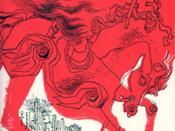In Salinger's novel "The Catcher in the Rye", Holden, the novel's protagonist, is a character that is growing from youth to maturity. Throughout the novel, Holden resists the process of maturity itself by admiring children and criticizing the adults' way of thinking and behaving. Holden creates his own theory that adulthood is a world of superficiality and phoniness, while childhood is a world of honesty and innocence. In fact, "phoniness," which is probably the most famous phrase in the novel, is one of Holden's favourite concepts. Phoniness becomes a phrase that Holden uses to describe the hypocrisy of adults. However, the criticisms that Holden directs at adults around him are also directed to himself. He is uncomfortable with his own weaknesses, and at times shows as much meanness and hypocrisy as any other adult in the book. As the novel progresses, we see that Holden is standing poised on the cliff separating childhood from adulthood.
Unable to neither maintain himself as a child nor become a full-fledged adult, Holden finds himself in the midst of an emotional break down.
Throughout the novel, Holden criticizes adults by constantly using the term "phony" to describe the superficiality and shallowness of their actions. As he flits from one meaningless encounter to another, Holden tries to enforce his view on different aspects of the hypocoristic realm of adulthood. He first criticizes adults whose surface behaviour distorts and disguises their inner feelings. We see this when he criticizes Mr. Spencer, a former history teacher who is very old and ill with the flu, for the way he describes his parents. "Grand. There is a word I hate. It's a phony. I could puke every time I hear it" (Salinger 9). He then points out the deceitfulness of adults as he talks...


